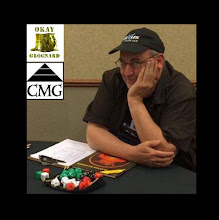The Board Game Geek description runs as follows:
In this Sid Sackson classic, players must press their luck with dice and choose combinations tactically to close out three columns. The board has one column for each possible total of two six-sided dice, but the number of spaces in each column varies: the more probable a total, the more spaces in that column and the more rolls it takes to complete.
On their turn, a player rolls four dice and arranges them in duos: 1 4 5 6 can become 1+4 and 5+6 for 5 & 11, 1+5 and 4+6 for 6 & 10, or 1+6 and 4+5 for 7 & 9. The player places or advances progress markers in the open column(s) associated with their chosen totals, then chooses whether to roll again or end their turn and replace the progress markers with markers of their color.
A player can only advance three different columns in a turn and cannot advance a column which any player has closed out by reaching the end space; if a roll doesn't result in any legal plays, the turn ends with that turn’s progress lost.
In our recent game, I tried playing a bit more conservatively than in past attempts (most of which ended in losses). I understand that is a relative term but I think it is also true that a player in a regular group can become predictable to a certain degree and that's the dynamic I have been examining lately.
Not so much with this particular game session but lately I've even made sure predictability and play styles were a part of the table talk, the conversation around the local game tables, to make sure I hear some fresh views on these concepts (though not necessarily in so many words). At some point, if you're designing games or running them regularly, you have to make the leap beyond the math and the production values and understand what happens when the rubber meets the road. And this isn't just true about how a specific game plays and how folks interact with it but how people in general approach any game at all. I've observed this over forty plus years of playing and running and creating games but rarely have I actively pursued open discussion on it, mostly just listening to the tidbits and storing them away. I admit now that, like a spy in the house of games, I have been seeding the discussions and introducing certain ideas casually to gain more knowledge about what goes on in the minds of gamers as they play this game or that. I generally don't divulge this information in the form of quotes here in this blog but I hope those who read this blog and play with me regularly understand that it is a part of the process. They should wind up with better games to play for it.
Focusing on the roots of current tabletop gaming
with an eye toward the last century and before.
with an eye toward the last century and before.
Please Like, Share, Plus, Tweet, Follow, and Comment!






No comments:
Post a Comment